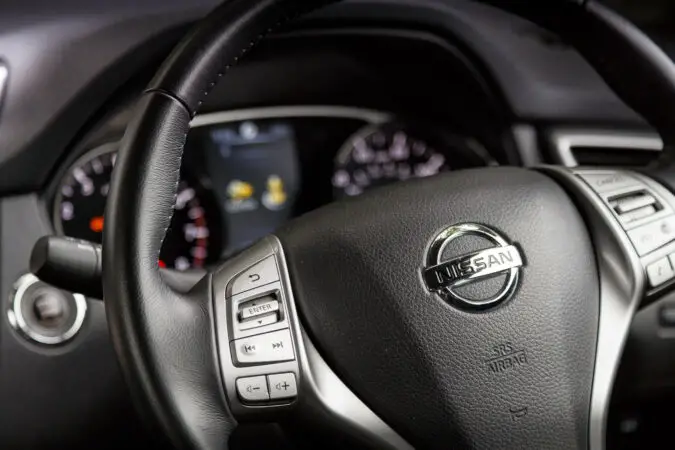Nissan is renowned for producing high-quality, dependable vehicles. However, Nissan is not a faultless firm, despite its reputation. so, what are the Nissan Altima 2014 problems? This is what we plan to explore in this post.
The 2014 Nissan Altima is a midsize vehicle with a price range of $11,929 to $16,938. The Altima is a vehicle that purchasers should steer clear of due to numerous owner complaints and costly transmission breakdowns.
- 2014 Nissan Altima
- Nissan Altima To Avoid
- Nissan Altima Problems
- Altima AC Problems
- Altima Radio Problems
- Frequently Asked Questions
2014 Nissan Altima
1. Overview And Background
Among the big automakers, Nissan has a reputation for taking some risks, but the 2014 Nissan Altima is all about sticking to the plan. The Altima sedan hasn’t changed much since its facelift from the previous year, which brought it closer to the larger Maxima’s sense of style.
The Altima is Nissan’s best-selling sedan and one of the best options for a midsize family sedan, so there is good reason to be cautious.
The intelligently calibrated ride and handling of the Altima is a key component of the car’s recipe. Although it doesn’t beat you up over bumps, the Altima seems more concentrated and sensitive than many of its competitors.
The Altima’s continuously variable transmission (CVT), which contributes to the vehicle’s great fuel economy (31 mpg combined with the four-cylinder engine) and powerful, fluid acceleration, is the kind of feature that stands out during a test drive.
The 2014 NissanConnect Apps, a new smartphone integration system that integrates applications like Pandora, can enhance the Altima’s reputation for having comfortable interior furnishings.
Every Altima, as usual, delivers premium cabin materials and a stylish, athletic dashboard. The only drawback, which is a small one, is the lack of headroom in the back, which can be a problem if you frequently transport tall people.
Of course, there are several sedans competing for your attention in addition to the Nissan Altima. The refined Honda Accord, the well-rounded Kia Optima, the dynamic Mazda 6, and the European-inspired Volkswagen Passat are additional great cars to take into consideration.
However, the 2014 Nissan Altima is unquestionably a favorite even among this elite group. If you plan to shop in this area, you must take this route.
2. MPG And Performance
The 2.5-liter four-cylinder engine in the 2014 Nissan Altima 2.5 sedan produces 182 horsepower and 180 pound-feet of torque. The front wheels receive power from a CVT.
The Altima is one of the quickest four-cylinder family sedans, reaching 60 mph from zero in 7.8 seconds in Edmunds performance testing. 31 combined mpg (27 city/38 highway), according to the EPA’s estimates, is a fantastic figure for a midsize sedan.
The 3.5-liter V6 in the Altima 3.5 variants produces 251 lb-ft of torque and 270 horsepower. In the testing by Edmunds, one Altima 3.5 variant reached 60 mph from zero in 6.2 seconds, once more placing it in the top half of the field.
A V6 gets a respectable 25 mpg combined (22 mpg city, 31 mpg highway) in terms of fuel efficiency.
3. Safety
Antilock brakes, stability and traction control, front side airbags, and side curtain airbags are all standard on the 2014 Nissan Altima. Except for the base and S trim levels, everything comes standard with a rearview camera.
A lane-departure warning system, rear cross-traffic warnings, and blind-spot monitoring are other optional features.
An Altima 2.5 SV sedan stopped from 60 mph in 130 feet during Edmunds testing, which is slower than the industry standard for midsize sedans. However, a 3.5 SL stopped in a fantastic 114 feet, which is roughly 10 feet shorter than the norm.
The Altima car scored a perfect five stars in federal crash tests for overall, frontal, and side collision protection.
Nissan Altima received the highest Good rating from the IIHS in its side-impact, as well as roof-strength crash tests. The Altima scored “Acceptable” in the new small-overlap front test (second best).
4. Driving
The 2014 Nissan Altima enthusiastically continues the torch for the Nissan Altima, which has a reputation for being one of the more enjoyable family sedans to drive.
For this class, the 2.5-liter four-cylinder engine provides performance that is above average. It produces more than enough acceleration for daily driving and revs willingly.
Although the CVT sometimes responds almost too quickly to power demands, which results in greater engine rpm and a little bit more noise than some would like, it helps to achieve excellent fuel economy.
The 3.5-liter V6 engine that is an option offers some of the class’s fastest acceleration. If you enjoy driving a lot, this vehicle is a wonderful option because of its still-respectable fuel efficiency.
The Altima has capable handling and quick, accurate steering around corners. However, ride comfort is still excellent, and both wind and road noise is pleasantly muted. The Altima is one of the greatest family sedans available for a blend of quick answers and long-distance peace.
5. Interior
The interior of the 2014 Nissan Altima is noticeably more premium, with high-quality materials and precise workmanship readily apparent.
With a large, easily readable speedometer and tachometer on either side of the appealing gauge cluster’s information screen, the gauge cluster is attractive.
Several apps, including Facebook and Pandora, are supported by the recently launched NissanConnect Apps system, with the addition of many more ownership-related apps anticipated in the future. If needed, the navigation system delivers thanks to its appealing graphics and simple user interface.
The carefully designed “zero gravity” front seats found in all Altimas are an ergonomic highlight.
The chairs were created to relieve frequent pressure points and enhance comfort over extended periods with the aid of NASA research. It works because the front seats of the Altima are more supportive and comfy than usual the instant you sit down.
Although average-sized adults will be comfortable in the back, there isn’t much rear headroom compared to other sedans in this class, and there isn’t much rear legroom either. 15.4 cubic feet of trunk capacity is roughly average, despite the extremely large aperture.
Nissan Altima Years To Avoid
There is a good reason why the Altima mid-size sedan is so well-liked. The majority of the Nissan Altima’s versions are solid choices if you’re wanting to purchase one used. There are a few Nissan Altima model years that you want to avoid due to problems such as the Nissan Altima 2014 problems.
Avoid purchasing a used Nissan Altima during these years:
2002 Nissan Altima
Customers’ reviews of the 2002 Altima on CarComplaints.com show that there have been over 1,000 complaints and over 12 recalls, which doesn’t give prospective purchasers much hope. The 2002 Altima has some of the worst issues, including high oil usage, catalytic converter failure, and exhaust system issues.
Many owners have reported that their Altima started billowing smoke and guzzled oil like crazy. The cost to correct this specific oil consumption problem is estimated to be around $3,300+, which is absurd. Currently, purchasing a 2002 Altima is a major gamble because it is simply much too old.
The 2002 Altima’s flaws are so serious that Car Complaints awarded it the “Avoid Like the Plague” mark.
2005 Nissan Altima
According to CarComplaints.com, the 2005 Nissan Altima is yet another vehicle with over a thousand complaints. Engine problems, body/paint problems, and transmission problems were the three areas that received the most complaints.
The corroded floor pan is one of the main problems with the 2005 Altima. The floor pan eventually became so rusty that a basketball-sized hole appeared under the floor mat. This issue typically costs around $1,000 to fix. The 2005 Altima experiences excessive oil consumption around 100k miles, which might result in $2,000 in repair costs for owners.
Last but not least, the climate system usually fails after 100k or more miles, and a replacement can cost up to $1,400.
2009 Nissan Altima
The 2009 Nissan Altima is one of the worst models to steer clear of with over 2000 complaints. Looking at the defect categories, it appears that the 2009 Altima has a significant steering issue.
In particular, many Altima owners have encountered the dreaded steering wheel lock, which made it impossible for drivers to maintain adequate control of the car. Of course, there is a significant safety concern here, and repairs often cost $960.
In addition, a whining sound that gets louder as the vehicle speeds have also been reported by many consumers. It appears that this was a transmission-related problem, which typically manifests itself at about 100k miles. The warranty will typically cover the $5,700 average repair cost for this problem.
2013 Nissan Altima
The 2013 Nissan Altima is the worst model year to avoid, based solely on the volume of complaints, according to Car Complaints. With over 3,000 complaints and the “Avoid Like the Plague” badge of disapproval, the 2013 Nissan Altima ought to be among the worst models to stay away from.
The 2013 Altima’s defective CVT transmission mechanism is to blame for the majority of the complaints. The transmission frequently becomes stuck while a customer is driving, requiring them to stop and restart the car. You may have to pay up to $3,000+ for repairs because the model is no longer covered by a warranty.
The 2013 Altima’s climate system is yet another area where it struggles the most. According to numerous accounts, the compressor rubs against the car’s structure, causing damage to occur more quickly. You will typically have to pay $1,200 to fix this issue.
Occasionally, buying a car can be frustrating, especially if you’re doing it through a dealership. We’re here to give you advice on how to handle a scenario in which a dealer won’t revoke your extended warranty.
2016 Nissan Altima
Although it’s not the least dependable car on this list, the 2016 Altima does have a few issues that you might not want to deal with. The 2016 Nissan Altima had a Reliability Rating of 1 out of 5 overall from Consumer Reports.
The 2016 Altima’s gearbox system continues to have issues. A common complaint among owners is that their car would suddenly stop accelerating in traffic or that the transmission would mostly slip when turning. Expect to spend roughly $4,260 on a replacement for the transmission.
Problems With 2014 Nissan Altima
The 2014 Nissan Altima has what issues?
Recalls and issues with the 2014 Nissan Altima include faulty hood latches and malfunctioning airbags. Because it has more issues than comparable sedans in its price range, the 2014 Nissan Altima is a vehicle that purchasers should avoid. Owner complaints about models from 2015 and after are less frequent.
Transmission breakdowns occur every 70,000 miles on average. The only fix is to replace the transmission entirely, which costs close to $4,000. When you observe excessive noise and trembling while accelerating, a transmission issue is frequently the cause.
Also highlighted by owners are issues with the headlights. Usually, an issue with the housing will cause the headlights to begin to dim. The issue can be resolved by replacing the entire assembly for roughly $650, but Nissan has not done so.
Nissan Altima 2014 problems with the infotainment system and navigation might also occur, with the system freezing while driving. The issue is typically resolved by replacing the head unit for roughly $500, although occasionally it will persist even after the replacement.
There have been eight recalls, which is typical for a 2014 model. The hood latch, gasoline-sending unit, and airbags are among the items being recalled. The gasoline-sending unit is the most dangerous since fuel leaks might cause flames in the case of a crash.
2014 Nissan Altima Transmission Problems
One of the most crucial components of your 2014 Nissan Altima is its transmission. If your 2014 Nissan Altima experiences transmission issues, it may become impossible to drive.
Your 2014 Nissan Altima’s transmission is the component of the 2014 Nissan Altima that transfers engine power to the driveshaft, which in turn aids in turning the wheels. Maintaining your gearbox properly will always improve its performance, extend its lifespan, and reduce the number of repairs it needs.
However, if your transmission does experience issues, being aware of some of the most typical transmission issues will speed up your ability to identify and fix them. So, the most typical transmission issues are.
Nissan Altima 2014 Problems #1 – Leaks Or Low Fluid Levels
The most recurring issues with the transmission include low transmission fluid levels as well as fluid leakage. Leaks in the transmission itself are typically to blame for low transmission fluid levels.
The transmission’s seals or the driveshaft could get Nissan Altima 2014 problems to become faulty and start to leak fluid. To stop transmission leaks, transmission gasket seals may occasionally need to be replaced. In some cases, coolant in the radiator could end up contaminating the transmission fluid. This is referred to as cross-contamination.
In general, slow shifting or gear slippage are signs of low fluid levels or fluid leaks. If the fluid is old or contaminated, it must be replaced, and the transmission must also be properly cleansed and refilled.
Nissan Altima 2014 Problems #2 – Issues With Torque Converters
Transmission damage or failure can be caused by a variety of issues with torque converters and transmissions. Needle bearings that wear out are among the torque converter’s most recurring problems.
You will normally hear strange noises coming from the transmission when you switch to driving gears in case the needle bearings become warm. The transmission will likely not produce any odd noises when the vehicle is in neutral, but it would likely make grinding or brushing noises when it is in the drive.
Nissan Altima 2014 Problems #3 – Solenoids Issues
The solenoid manages the transmission’s fluid flow. Many times, the solenoid can suffer damage as a result of inadequate fluid levels or even other electronic problems.
For the most part, solenoid problems are similar leaks or insufficient fluid levels. The solenoid should be checked next if the 2014 Nissan Altima’s transmission is slipping and there are no leaks.
Nissan Altima 2014 Problems #4 – Clutch Issues
The clutch, which is within the torque converter, will sometimes stick. The solenoid could lock up when the clutch jams and the amount of transmission fluid in the torque converter may not be the correct amount.
These torque converter clutch issues also are similar to low fluid levels. In addition to resulting in intense shaking under the vehicle, clutch issues can also cause the transmission to become extremely hot. In most cases, you’ll also notice a dramatic decrease in your engine’s power output.
2014 Nissan Altima AC Problems
The four most common Nissan Altima AC issues include:
1. Control Valve For The Compressor
Your AC system may go down due to a faulty compressor control valve. The most typical indication of a bad control valve is that the air leaving the vents isn’t cool.
It could be slightly warm or cold. Additionally, it results in a discharge pressure that either remains the same or decreases as the suction pressure rises above typical limits.
2. AC Refrigerant Leaks
A leak in the low-pressure AC hose is the most frequent reason for a refrigerant leak in a Nissan Altima. Usually, this happens at the crimp connection. Warm or hot air will come out of the AC if there is a refrigerant leak.
You must conduct a dye test to determine if this is your car’s issue.
You can get this at your neighborhood dealership or mechanic shop, but it’s very simple to do it yourself. The dye will go through your air conditioner, and a UV light will help search for leaks.
3. Faulty Climate Control
The temperature control system in your car is essentially the brain that controls when to turn on and off the air conditioning. The Nissan Altima’s interior features several sensors that feed data to the temperature control system.
Your AC system won’t function properly if the sensors are faulty. A failure can also occur with the climate control module itself.
4. AC Compressor
Fortunately, this is a relatively uncommon cause of Nissan Altima AC issues. Additionally, its repair cost is the highest on this list. The most typical indication that an AC compressor is malfunctioning is when it stops blowing chilly air. Naturally, this also indicates the other issues on this list.
The compressor is making a noise, which is another indication. There’s a significant probability you’ll need to repair your compressor if your AC isn’t working properly and you hear an odd noise coming from the engine compartment.
2014 Nissan Altima Radio Problems
The 2014 Nissan Altima is a vehicle with a lot to recommend, including its sports car-like handling, best-in-class fuel economy, and luxury interior upholstery.
Unfortunately, there are several issues with the factory radio. Because of this, many Nissan Altima owners decide to replace their stock radio with an aftermarket model.
In a few easy steps, you can replace the radio in a 2014 Nissan Altima. All you have to do to install the aftermarket radio of your choosing is pop off the silver bezel, and remove the air conditioning unit, vents, and a few screws.
Do not worry if you are unsure about where to start. To accomplish the hassle-free switch, we have more thorough instructions below. To start, simply grab a Phillips screwdriver and a dashboard removal tool!
Step 1: Taking Away The Silver Bezel
To free the radio from any clips holding it in place, use the dashboard remover tool to maneuver around the silver bezel’s edge on either side. This step should cause the silver bezel to release.
Step 2: Remove The Three Fasteners
On either side of the stereo are three screws. Put the tip of your Phillips screwdriver into the screw’s notched head and turn it counterclockwise to remove the screw. All three screws were removed, and they were stored for future use.
Step 3: Take Out The AC System And Vents
To remove the A/C unit panel from beneath the radio, wrap your fingers around it. To open the A/C vents above the radio, repeat this action.
Step 4: Take Out The Fasteners
Take out the mounting screws holding the radio in place. Remove the two mounting screws on top of the radio first. Also, remove the second set of mounting screws on the radio’s bottom.
Step 5: Remove The Radio
To remove the radio, take it apart and unplug the wiring harness. Yes, it is that simple.
Reversing these procedures should enable you to install your new aftermarket radio system. However, before you can fit them, some aftermarket configurations need modification.
Before beginning the installation, carefully read the radio’s instructions. If any vehicle changes are necessary, have a competent mechanic work on your Altima to ensure everything is working well.
Frequently Asked Questions
How Long Do Nissan Altimas Last
Whether you drive a sedan or a coupe, the Nissan Altima is a fantastic car to own. You can anticipate your Nissan Altima to last 200,000 to 300,000 miles—or 13 to 20 years—because Nissan is committed to quality and performance.
What Is Nissan CVT Transmission
A CVT is a type of automatic transmission which runs a belt made of steel between a couple of pulleys. The drive pulley diameter, which transmits power from the motor, as well as the pulley, being driven, which then transmits the torque to the car wheels, are simultaneously adjusted by the CVT to continuously modify its gear ratios.
Does Nissan Altima Have Transmission Problems
Nissan Altima owners and lessees have complained about several persistent CVT transmission faults, including lurching, acceleration problems, vehicle overheating, and early transmission failure.





